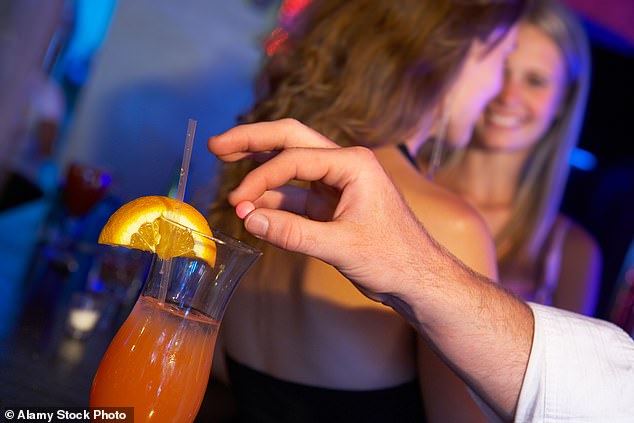This Morning presenter Ashley James has told how she has been spiked ‘multiple times’ after worrying new data revealed that almost 7million Britons may have had their drinks laced with drugs.
A survey of 3,000 UK adults commissioned by CounterSpike earlier this month saw 12 per cent of respondents say they had been spiked during their lifetime, with a further 22 per cent saying they at least knew someone who had been, even if they hadn’t.
If those totals were uniformed across Britain, that would mean around 6.6million adults had been spiked at some point in their lives.
The troubling data comes as police forces across the UK deal with soaring reports of spiking in their areas, figures which have drastically shot up in the last five to six years.
Freedom of Information data revealed that Greater Manchester Police had recorded 463 spiking incidents last year alone, an increase of 261 per cent since 2019, with 128 incidents recorded.
West Midlands Police also logged 183 suspected spiking incidents against women in 2024, compared to 25 in 2020, a 632 per cent surge.
And West Yorkshire saw 444 cases of spiking recorded last year, a 210 per cent increase from the 143 dealt with in 2019.
Ms James said she believes that she has been spiked on numerous occasions during her time at university and when she has spent time in London.

This Morning presenter Ashley James has told how she has been spiked ‘multiple times’ after worrying new data revealed that almost seven million Britons may have had their drinks laced with drugs

Freedom of Information data revealed that Greater Manchester Police had recorded 463 spiking incidents last year alone, an increase of 261 per cent since 2019 (Stock Image)
She told The Sun: ‘Having spent a lot of time in nightlife spaces – especially working as a DJ – I’ve sadly seen just how common spiking still is.
‘Several of my close friends have had their drinks spiked, both in the UK and abroad, and there‘s lots of cases where boys are spiked for pranks.
‘It seems like everyone, including myself, has either been spiked or knows someone who has.’
The TV host, who is an ambassador for CounterSpike, who have created a kit which allows you to test your drink for unwanted substances, added that she would never a drink from a stranger or leave her glass unattended on a night out anymore.
Spiking is illegal and carries a sentence of up to ten years in prison, but it is often followed by the victim being targeted for robbery, theft, or sex crimes.
The drink-tampering tactic most commonly occurs in places like bars, nightclubs and at festivals. And amid a rise in vape users in the UK, officers last year warned that some offenders were even lacing the smoke devices with psychoactive drugs.
The latest data released by the National Police Chiefs Council also revealed that of their 6,732 recorded spiking cases between April 2022 to April 2023, 957 of those were by needles – meaning victims had drugs injected straight into their bloodstream.
Further research last year showed that despite 13 per cent of women and nine per cent of men believing they have been the victim of spiking, nine-in-10 do not report it to police.

West Midlands Police logged 183 suspected incidents of spiking against women last year, compared to 25 in 2020, an astonishing 632 per cent increase (Stock Image)
Sir Keir Starmer pledged last November to tackle the epidemic by training 10,000 bar staff to spot spiking happening as moves to make it a specific criminal offence were brought forward.
Bartenders and bouncers were taught how to identify offenders and victims under a new drive to cut down on the number of people being given knock-out drugs on nights out.
The Prime Minister said this would ‘enable everybody to have the confidence to come forward’ and ‘allows perpetrators to know that it’s a specific offence.’
A poll by Drinkaware and Anglia Ruskin University last year found that just 10 per cent of spiking offences are reported to police, with half of those targeted saying they ‘don’t see the point’ of reporting it.
The Home Office also allocated £250,000 to train pub and bar workers how to prevent spiking.
That money funded training for up to 10,000 serving staff and ‘bouncers’ who were taught how to spot the signs of a potential offender, protect victims and preserve evidence for police.

Sir Keir Starmer pledged last November to tackle the epidemic by training 10,000 bar staff to spot spiking happening as moves to make it a specific criminal offence were brought forward
A government spokesman said the new offence would mean perpetrators will ‘feel the full force of the law’.
Speaking last year, Sir Keir said: ‘We must do more to bring the vile perpetrators who carry out this cowardly act, usually against young women and often to commit a sexual offence, to justice.
‘That is why I made a promise that, if elected, I would make spiking a new criminal offence. Today, I am proud to have come good on that pledge.’
He added: ‘I will bring together police chiefs, heads of industry and transport bosses to demand coordinated action to stop women being targeted, whether they are out with friends or simply travelling home.
‘Cracking down on spiking is central to that mission.’
Home Secretary Yvette Cooper said: ‘These changes are about giving victims greater confidence to come forward, and ensuring that there is a robust response from the police whenever this appalling crimes take place.’
A Home Office report published in December 2023 said they had ‘made great strides to understand and more effectively tackle spiking’.
The report said key to this was placing a significant victim-first approach, adding: ‘Our priority has been to ensure that victims have the confidence to come forward and report these crimes and that they are taken seriously when they do so.’
MailOnline has approached the Home Office for further information.












